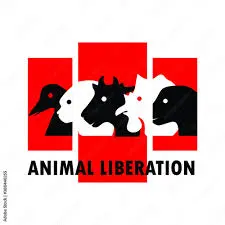this post was submitted on 15 Nov 2024
42 points (88.9% liked)
vegan
6811 readers
1 users here now
:vegan-liberation:

Welcome to /c/vegan and congratulations on your first steps toward overcoming liberalism and ascending to true leftist moral superiority.
Rules
No plant-based diet bullshit or promotion of plant-based capitalism.Veganism isn't about you, it's about historical materialist anti-speciesism, anti-racist animalization, and animal liberation. Ethical vegans only.No omni apologists or carnists.Babystepping is for libs, and we're not here to pat you on the back. Good faith questions and debate about how to fight for animal liberation are allowed.No advocating violence to any species for any reason.If you think this is negotiable GTFO. This includes but is not limited to animal testing, slaughter, and mass euthanasia. Anything that promotes speciesism or the commodification of animals will be removed.Use Content Warnings and NSFW tags for triggering content.Especially if a comrade requests it.Questions about diet belong inc/food. It's also a great place to share recipes.In all sections of the site, you must follow theHexbear.net Code of Conduct.
Resources
Animal liberation and direct action
- Animal Liberation Press (ALF)
- Wiki on Ethical Veganism
- Wiki on the Animal Liberation Front
- Wiki on Total Liberation
- Different approaches to AL direct action
- Earth First! manual and tactics
- Support prisoners of conscience: Vegan Prisoners Support Group (UK)
- If someone tells you to put some paint on your hands, tag some buildings and then go turn yourself into the police - your "rebellion" is a fucking op
Read theory, libs
- 18 Theses on Marxism and Animal Liberation
- Racism as Zoological Witchcraft: A Guide to Getting Out
- Animal Liberation
- The Death of Nature
- The Case for Animal Rights
- Anarchism and Animal Liberation
- Total Liberation
- The Unbearable Whiteness of Milk
- Speciesism as a Precondition to Justice
- Beasts of Burden: Animal and Disability Liberation
- Citations Needed on media portrayals of animal rights activists
- The Jungle
Vegan 101 & FAQs
- Black Vegans Rock resources page
- Animal Rights: The Abolitionist Approach FAQs
- 30 Non-Vegan Excuses & How to Respond to Them
- Guide to justifications for harming and exploiting animals
- Your Vegan Fallacy Is
- The Radical Left’s Top 10 Objections to Veganism (And Why They Suck)
- Animal Liberation Front FAQs
If you have any great resources or theory you think belong in this sidebar, please message one of the comm's mods
Take B12. :vegan-edge:
founded 4 years ago
MODERATORS
you are viewing a single comment's thread
view the rest of the comments
view the rest of the comments
I don't know if it's all of them, but I know someone who said that veganism is actually more harmful for the planet because plants need pesticides and fertilizer, which kill bugs. It took no effort to challenge them on that at all.
What do they think livestock eat?
pesticides and fertilizer!
Sounds like my coworker who argued that veganism kills more animals than meat does, due to the pest control measures that might be necessary to protect crops.
As if pest control isn't a thing in the meat industry from the feed crops, to the feed lots, to the barns to the slaughterhouses. They think the cattle that made the steak they're eating just materialized out of thin air or something and didn’t require a shit ton of energy and resources to grow it.
Yep, that exact point.
There's an element of truth here, in that parts of the world have a system where farm animals eat stuff humans can't, such as wild grass, kitchen waste and straw. But modern 'factory farms' do use insane amounts of growth su0lements and medicines, which are just as bad.
The carbon, nitrogen, etc. contained in that grass, waste, and straw should be buried in/returned to the soil to grow plants instead of being farted into our atmosphere. Assuming the land in question is arable in the first place (which I think is valid if it's producing enough plant matter for grazing to be viable), if managed at all would produce more calories of human-compatible nutrition per calorie invested than harvesting of grazing animals on said land would.
There's land that isn't good enough to grow crops, but is good enough for wild plants to grow. You can, as you said, 'manage' it - give enough fertiliser and water to make it suitable for agriculture. But that is often unaffordable for the people living in such places, so using animals to gather and concentrate the available nutrients is the best option available to them.
That's an orthogonal injustice though, no? Collectively, our species massively overproduce food, so I would think the fact that there is a prior reason to be trying to cultivate land like this, which ought to be managed for native flora/fauna is a separate and solvable large scale land allocation problem, the solution to which frees whatever livestock use the argument excuses.
The economist Amartya Sen, who studied famines in South Asia and Africa said that 'starvation is the characteristic of some people not having enough food to eat. It is not the characteristic of there being not enough food to eat." Producing more food than we need means nothing if it does not reach everyone.
I would say it is more of a food-allocation problem. Land redistribution is a great thing, and has worked in the past. But natural disasters and crop failures can occur in regions, and larger farms can benefit from long-term planning and more scientific management. So the better solution, in an ideal world, would be to focus on guaranteeing food rather than land.
Solving food security will of course greatly reduce this problem, although personally I am worried that food availability will get worse in the coming years and decades due to the various ways in which we are damaging the environment.